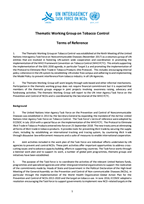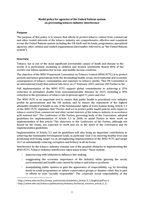Tobacco use is the leading, fully preventable cause of mortality globally. An estimated 1.3 billion people worldwide use tobacco products. Tobacco kills more than 8 million people each year, including 1.3 million non-smokers who are exposed to second-hand smoke. Tobacco use contributes to poverty by diverting household spending from basic needs, such as food and shelter, to tobacco.
A number of interventions are highly effective in reducing tobacco use but in most countries are not fully implemented.
The Secretariat of the WHO Framework Convention on Tobacco Control is a member of the Task Force. Task Force members work together to provide support to Parties of the Framework Convention to implement a range of tobacco supply and demand measure as well as implementing the Protocol to Eliminate Illicit Trade in Tobacco Products.
More brief are avalibale here.

Thematic working group on tobacco control ToRs
The Convention Secretariat, in partnership with the WHO, UNDP have provided support to a number of Parties through the FCTC 2030 project. A key support for FCTC 2030 project countries has been the development of an WHO FCTC investment case. These investment cases analyse the health and economic costs of tobacco use as well as the potential economic benefits that can come from implementing key WHO FCTC measures. The 18 WHO FCTC investment cases that have been undertaken can be accessed here.
During the COVID-19 pandemic, the Task Force developed the Access Initiative for Quitting Tobacco (AIQT). The initiative, developed between the Task Force Secretariat, WHO, PATH and the Coalition for Access to NCD Medicines and Products, with support from the private sector gave people free access to nicotine replacement therapy and to Florence, a digital health worker based on artificial intelligence that dispels myths around COVID-19 and tobacco and helps people develop a personalized plan to quit tobacco. AIQT was the first project developed in response to the ECOSOC call upon the Task Force to scale-up access to NCD diagnostics, treatment and care to provision with safe, effective, quality and affordable essential medicines for all, as well as to promote health technologies for stronger health systems, including regulatory frameworks and good supply chain management.
Access Initiative for Quitting Tobacco Infographic
The Task Force has agreed a model policy on preventing tobacco industry interference to support its members to ensure that efforts to protect tobacco control from commercial and other vested interests of the tobacco industry are comprehensive, effective and consistent across the United Nations system.
Members of the Task Force are in the process of finalising a alternative livelihood toolkit.

